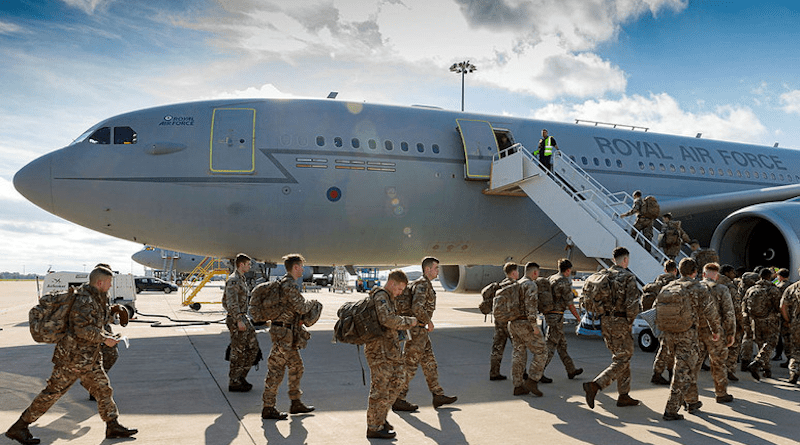Kosovo Remains In Purgatory As Tensions Rise Again – OpEd
By Arab News
By Yasar Yakis
Small problems are sometimes more difficult to solve than big ones. The formal recognition of Kosovo is one of them because Russia opposes it in the UN Security Council — or rather the disputed status of the Mitrovica district.
When late President Josip Broz Tito ruled Yugoslavia after the Second World War, he must not have paid much attention to whether Mitrovica, a town in the north of the autonomous region of Kosovo, should belong to Serbia or to Kosovo. However, it has now become one of the bleeding wounds at the heart of the Balkans. Belgrade, which did not bother for decades that Mitrovica should be governed by Serbs, has woken up to the reality that this town is in Kosovar territory.
About 90 percent of Kosovo’s population are Albanians. But the Christians — both Catholic and Orthodox — are opposed to Kosovo joining Albania because this would further tilt the balance in favor of the Muslim population.
This article will focus on the problems between Serbia and Kosovo.
Kosovo has a population of about 2 million. It unilaterally proclaimed independence from Serbia in 2008. The UN General Assembly approved its independence and more than 100 countries now formally recognize Kosovo. The question of the recognition of Kosovo has not been tabled at the UN Security Council because Russia would oppose it.
The majority of Albanians are Sunni Muslim. Because former President Enver Hoxha ruled Albania with extremely oppressive measures, many Albanians deserted their homeland and were scattered almost all over the world, including Italy, Argentina, Greece, Romania, Croatia, Turkiye, Scandinavia, Switzerland, Germany and the US. Albanians have also settled in Australia, Brazil, Canada, France, Belgium, the UK, New Zealand and the UAE.
Though Kosovo is not part of Serbia, the Serbs consider it a historic city because, more than six centuries ago, in 1389, a wounded Serbian knight killed the Ottoman Sultan Murad I when he was inspecting the aftermath of a battle. This Battle of Kosovo marked the beginning of the implantation of the Ottomans in the Balkans. The Serbian knight’s courage went on to become a symbol of bravery for Serbs throughout the centuries. Although Kosovo has never been a Serbian city, the fact the Turkish-Serbian war was fought there makes it a sacred city in the eyes of Serbs.
Several centuries later, Kosovo again became a bone of contention, this time between Serbs and Kosovars. A military conflict broke out in 1998 between Kosovo and Serbia and lasted almost a year and a half. It was fought between the now-extinct Yugoslavia and an Albanian rebel group called the Kosovo Liberation Army. NATO forces intervened in favor of the Kosovars, carrying out airstrikes, and the Yugoslav forces had to withdraw from Kosovo. A Military Technical Agreement was signed on June 9, 1999, in Kumanovo, Macedonia, between NATO’s Kosovo Force and Serbia. The Kosovo Force entered Kosovo on June 11, the day after the UN Security Council adopted Resolution 1244 confirming that Serbia had to evacuate Kosovo.
There have always been clashes between Serbs and Kosovars, the last major one being in 2020. The clashes restarted last month, especially in the Mitrovica area, leaving one Kosovar policeman and three Serbian gunmen dead.
About 50,000 Serbs living in North Kosovo reject their Kosovar citizenship and continue to recognize Belgrade as their capital.
In the aftermath of the clashes, Belgrade and Pristina accused each other of starting the conflict. There are 4,500 NATO troops still stationed in Kosovo as a peace-keeping mission, but without a specific mandate from the alliance they may remain as distant as possible from this impending clash. White House spokesperson John Kirby said that Serbia was massing an “unprecedented” number of forces along the border.
The prospects of the situation stabilizing any time soon are not encouraging. Kosovo officials claim that those who were caught in Mitrovica were sent there by the Serbian authorities. They also claim that there are terrorists sent from Russia, but this claim does not seem to be convincing, as Moscow can hardly spare fighters to be sent to fight in Kosovo. Graffiti on the wall of a house in northern Mitrovica read: “Kosovo belongs to Serbia and Crimea to Russia.”
During last month’s clashes, about 30 masked men opened fire on a Kosovar police patrol. The patrol responded with fire and the Serbs barricaded themselves in a Serbian monastery.
No matter what either side says, the tension remains high. The mutual trust is low and the positions of the two sides do not seem to be bridgeable.
The EU and US are trying to strike a deal to normalize relations between Serbia and Kosovo. Russia blames the West for failing to protect Kosovo Serbs. It may also try to turn the attention of the international community from the Ukrainian war to the Balkans.
The Serbs and Kosovars lived side by side for centuries. These harmonious relations were unfortunately spoiled after the dismemberment of Yugoslavia.
We may still hope that, with the help of unbiased international actors, calm will prevail in this adorable geography.
— Yasar Yakis is a former foreign minister of Turkiye and founding member of the ruling AK Party.

